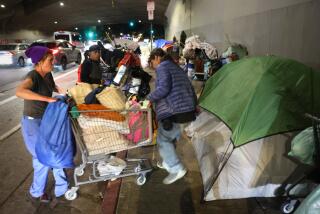Los Angeles weighs steps to hold its banks more accountable
Under pressure to deliver a law that will hold banks more accountable, the City Council began Monday to debate a proposal that would require some banks seeking the city’s financial business to disclose detailed information about their lending practices in Los Angeles.
The proposal falls far short of the ambitious agenda pressed by Occupy L.A., community activists and union workers who drew about 160 protesters to a raucous rally outside City Hall. It would not use the lending information to rate the banks when awarding city contracts for financial services, and it would not apply the reporting requirement to banks that also underwrite the city’s bonds.
Miguel Santana, the city’s chief administrative officer and the author of the slimmed-down proposal, described it as an attempt to strike a compromise between the banks and community activists. He had earlier warned the council that a proposed “responsible banking” ordinance could cost $58 million or more if it required the city to end contracts with some of its lenders.
He said the proposal would hold banks more accountable by exposing their lending records to public scrutiny. Every year, the banks covered by the proposal would be required to report by census tract on their loans to small businesses and their participation in programs to reduce mortgage principal for homeowners. The proposal would apply to the city’s retail bank, Wells Fargo; commercial banks that lend to the city; and any other bank that wants to do such business with the city in the future.
“We’re not letting anybody off the hook,” he said.
The institutions that do the city’s investment banking would be subject to different corporate responsibility reporting requirements, such as detailing their involvement in local charities or scholarships.
But Councilman Richard Alarcon, who proposed the “responsible banking” ordinance two years ago, told the Budget and Finance Committee on Monday that rating the banks based on the lending data was key to the proposed law’s aim to prod the banks to do more to help distressed homeowners and invest in the community. “Under a rating system, I believe we would create a race to the top,” he said.
He also encouraged the committee to consider extending the lending reporting requirement to banks that are involved only with the city’s investment banking business, which he said would go beyond what other cities have done. “We can be cutting-edge. We can be first in the nation,” he said.
At the same time, Alarcon also said he was pleased that the council was moving forward on the long-stagnant issue. At the rally, Alarcon credited community pressure for dislodging the idea. “We’ve come a long way because of this loud voice that has come from the people,” he said.
The crowd held placards saying “We are the 99%” and “Hold Banks Accountable” and a big banner reading “Take Taxpayer Money Out of Wall Street Banks.” Protesters, led by Michael Green, a deputy regional director with SEIU Local 721, sang out a rhythmic call-and-response to the snappy accompaniment of a snare drum and a bass drum.
“Banks got bailed out!” Green chanted. “We got sold out!” the crowded yelled.
Bob Schoonover, the local’s president, told the crowd, “Wall Street banks shattered this economy, which led to people losing their jobs, their houses. It led to local government’s funding being devastated, affecting city services. But the odd thing is they got bailed out by you know who. Us.”
Santana’s proposal called for the council to pass a broad ordinance that would commit the city to requiring banks to disclose lending information but would leave the details to be worked out by an ad hoc group that would make recommendations by the end of June. He suggested it include community activists, banking industry representatives and city officials. Alarcon countered with a proposal for a larger group that would also include community reinvestment experts.
The budget committee appeared poised to make a decision, but it postponed a vote until January to allow time for Santana to pull together a report that compares the competing proposals.
More to Read
Start your day right
Sign up for Essential California for news, features and recommendations from the L.A. Times and beyond in your inbox six days a week.
You may occasionally receive promotional content from the Los Angeles Times.






